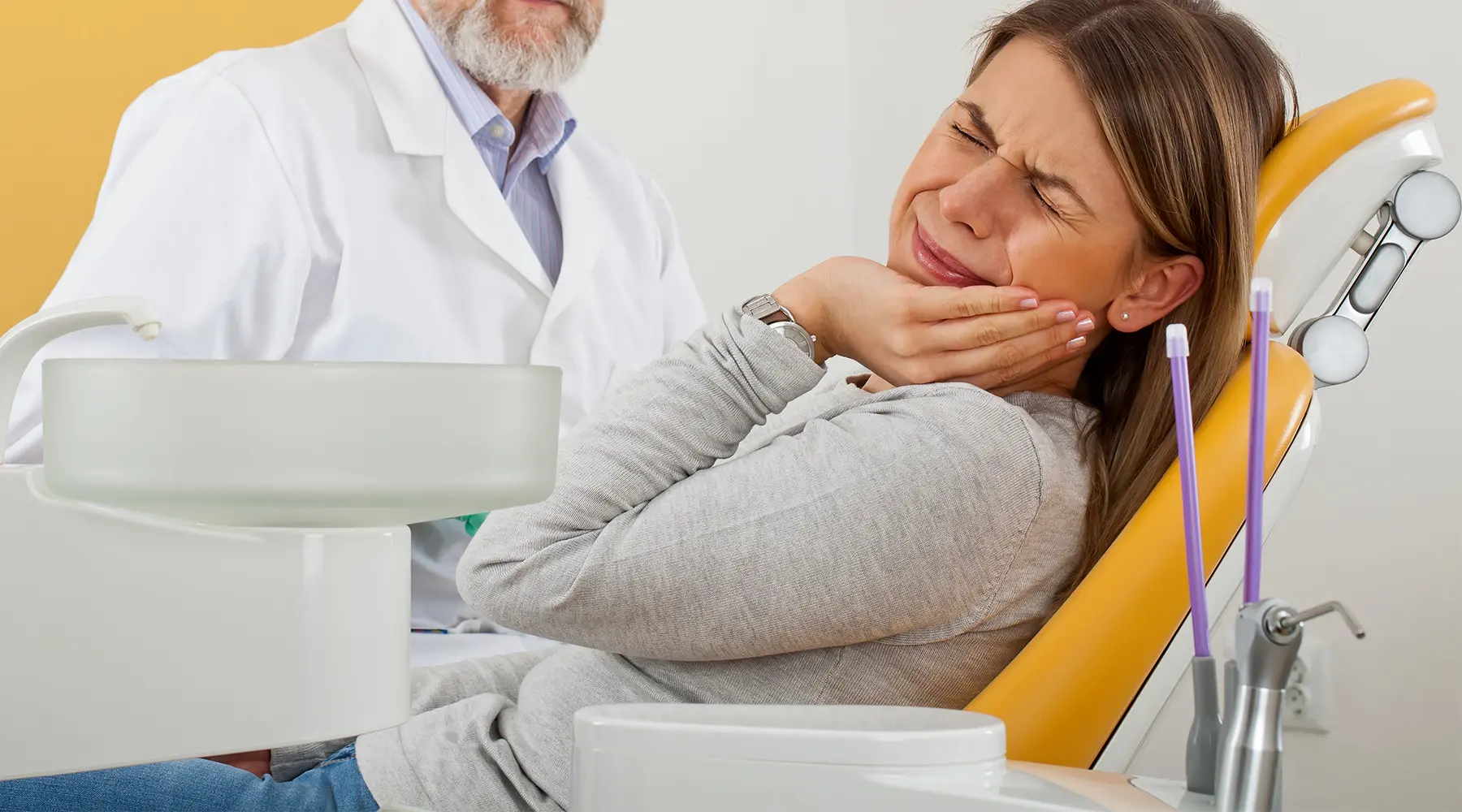Reviewed By Dr. Tyler N Davis, DMD
Reading Time: 4 minutes
Dental emergencies can happen suddenly and cause a lot of stress. Whether it is a broken tooth, severe pain, or bleeding, knowing what to do right away can make a big difference in protecting your oral health.
Table of Contents
What is Considered a Dental Emergency
A dental emergency is any situation that causes pain, bleeding, or injury and requires immediate attention. You should contact an emergency dentist or seek urgent care if you experience:
- Knocked-out or broken tooth: A tooth that has been completely knocked out (avulsed) or fractured with visible bleeding, exposed nerve, or sharp pain needs immediate attention.
- Severe toothache: Intense, persistent pain that does not improve with over-the-counter medication, or pain that spreads to your jaw, ear, or head, may indicate an infection or abscess that needs prompt care.
- Swelling or abscess: Swelling of the gums, face, or jaw—of any kind, even if there is little or no pain, fever, or difficulty swallowing—can signal a serious infection that requires urgent treatment.
- Uncontrolled bleeding: Continuous bleeding after a dental injury or extraction should be treated immediately to prevent complications.
- Injury to jaw or mouth: Trauma that causes pain, swelling, or difficulty moving or closing your mouth should be evaluated as soon as possible.
4 Steps to Take in a Dental Emergency
Acting quickly can make all the difference in saving a tooth and preventing infection. These five steps can help you stay calm, manage pain, and protect your oral health until you reach the dentist.
Step 1: Stay Calm and Assess the Situation
The most important first step is to stay calm. Take a moment to breathe and look closely at what happened. Check for swelling, bleeding, or broken pieces of tooth. Even if the pain seems mild, there could be hidden damage that needs prompt care.
Step 2: Control Pain and Bleeding
Gently rinse your mouth with warm water to clear away debris. If a tooth is chipped or cracked, apply a cold compress to the outside of your cheek to reduce swelling. For bleeding gums or soft-tissue injuries, hold clean gauze over the area for about 10–15 minutes.
If you have a severe toothache, swish with warm salt water to soothe the area and take acetaminophen or ibuprofen (if you can) for temporary relief. If the pain spreads to your jaw, ear, or head, or if swelling develops, contact an emergency dentist right away or proceed to the nearest emergency room.
Step 3: Preserve the Tooth if It’s Knocked Out
If a tooth is knocked out, pick it up carefully by the crown (the chewing surface), not the root. Rinse it gently with water, but do not scrub it. If possible, place the tooth back into the socket and hold it there with light pressure. If that is not possible, keep it moist in a container of milk or saliva or water and go straight to the dentist, ASAP! Getting professional care within 30–60 minutes offers the best chance of saving the tooth.
Step 4: Call for Professional Help
Once immediate pain and bleeding are under control, contact your dentist for guidance. Power Road Dental Care provides urgent dental care in Mesa, AZ, and can often see patients the same day. Quick action helps prevent infection, relieve pain, and protect your smile.
How to Prevent Dental Emergencies
You can’t always stop an accident from happening, but a few everyday habits can make dental emergencies less likely. Taking care of your teeth now helps protect them from cracks, breaks, and infections later.
- Wear a mouthguard during sports or physical activities to protect your teeth from impact, (and to prevent getting a concussion).
- Avoid chewing hard foods like hard or cubed ice, popcorn kernels, or hard candy that can cause chips or fractures.
- Use the right tools, not your teeth, to open packages or bottles.
- Practice good oral hygiene by brushing twice a day, flossing daily, and using mouth rinse.
- Schedule regular dental visits every six months for exams and cleanings to catch small issues before they turn into emergencies.
| When a Broken Tooth Needs Extraction If a tooth is fractured below the gumline or too damaged to repair, extraction may be necessary to prevent infection and protect nearby teeth. After the area heals, your dentist may recommend replacing the tooth with a dental implant to restore your bite and maintain a natural appearance. |
Call for Emergency Dental Care in Mesa, AZ
At Power Road Dental Care, we handle all types of dental emergencies with precision and compassion. If you need an emergency dentist in Mesa, AZ, call us for a same-day visit.
Call (480) 664-1438 to schedule an appointment or visit us at 2500 S Power Rd Suite 102, Mesa, AZ. If you are a registered patient experiencing a dental emergency outside our regular business hours, we will do our best to accommodate you ASAP.
Go to the nearest emergency room or urgent care center if you have severe swelling, uncontrolled bleeding, or facial trauma.
FAQs
What if I have a dental emergency but no money?
Don’t wait to get help. Call the dental office and explain your situation, many offer flexible payment plans or financing options. Delaying care often leads to higher costs and more serious complications.
What counts as urgent dental care?
Urgent dental care includes severe tooth pain, infection, swelling, bleeding, or broken teeth. Any issue causing constant pain or visible damage deserves immediate attention.
Where can I find an emergency dentist near me?
If you’re in Mesa or the East Valley, contact Power Road Dental Care for same-day appointments and expert treatment. Call (480) 664-1438 for urgent dental care or visit our office at 2500 South Power Rd #102, Mesa, AZ.

